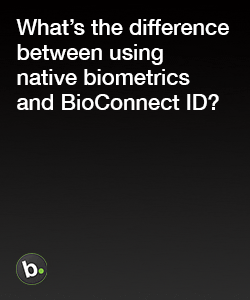There are a lot of moving parts to a business, and prime among them is the people who work there. So it’s no wonder that the enterprise sector has become one of the most active segments of the global biometrics market over the last several years. Identity management has always been a critical component of larger organizations, with keys and badges being issued carefully to those who need them and are authorized to have them. And these kinds of ID concerns have only become more important with the trend of digitization in the workplace – where once a secretary might have been given a key for a desk drawer containing important files, they’re now more likely to be issued a username and password instead.
But increasingly, even that isn’t good enough. The threats of hack attacks, data breaches, and even malicious corporate insiders are becoming intensifying areas of concern across a range of industries, with valuable information, legal liability, and customer trust on the line. And that’s why biometric technology is increasingly coming into play, offering a secure means of identification that can actually be faster and more convenient than passwords.
A Paradigm Shift in the Workplace
Recent surveys have helped to illustrate this trend. A Spiceworks poll of almost 500 IT professionals last year found 62 percent of respondents saying their organization had implemented biometric authentication. And while a more recent survey from Javelin Research suggested that two-thirds of businesses still rely on password-based security, there had been a 50 percent increase in the use of multi-factor authentication including PKI since 2017.
This shift is being reflected on the solutions provider end of the business, too. IDEMIA, for example, announced a major shift in its corporate structure in February with the consolidation of some of its most important business units – including those focused on biometrics – into the new Secure Enterprise Transactions division. And enterprise-focused biometric identity specialist BioConnect recently revealed that it’s working on an enhanced access control system for the enterprise that allows administrators to leverage multiple tools to step up authentication when and where appropriate.
Meanwhile, Gemalto indicated in its recently-published year-end fiscal results that it saw strong growth in its Identity, IoT & Cybersecurity business thanks in part to “growing enterprise demand for cloud-based cybersecurity solutions”, a trend that the company’s leadership expect to intensify.
Carrots and Sticks

The trends are clear enough, but what are the specific drivers pushing businesses to embrace biometrics? The most obvious one is probably the threat of hack attacks and data breaches: In its latest update based on its Breach Level Index, Gemalto reported that breaches over the first half of 2018 had increased compared to the same period in 2017, inching their way to 1,000 incidents; worse, the number of compromised records had skyrocketed to 4.5 billion, compared to 1.9 billion in the first half of 2017.
That isn’t the only factor, though. New regulations are also coming into play to compel businesses to take a stronger approach to data security, with Javelin’s survey finding that 70 percent of businesses were reporting regulatory pressures like those of the European Union’s PSD2 to adopt enhanced authentication systems.
Register for the Enterprise Biometrics Month Webinar on April 24 @ 11am EDT!

There’s also the ongoing rise of Bring Your Own Device culture in the workplace, with employees increasingly using their personal mobile devices to access key assets. Fingerprint sensors are now commonplace on contemporary smartphones, and it’s no coincidence that Spiceworks’ survey found this to be the most popular modality used by organizations that have embraced biometric authentication in its survey; going forward, it’s likely that facial recognition will come to play a greater role thanks to the pioneering efforts of Apple with its trendsetting Face ID system.
Not only is this kind of security more effective than passwords, it’s also more convenient. Employees like it: A recent Veridium survey of 1,000 US adults who have used biometric authentication found that 70 percent of them said they wanted to see this kind of security used more often in the workplace. Employers are responding in kind, with a recent Gartner analysis forecasting that the percentage of companies using smartphones for identity management will grow from five percent last year to 70 percent in 2022.
This is all good news for employers and employees alike, pointing toward a future in which identity management in the workplace is increasingly secure and convenient at the same time. And it’s a future that major solutions providers like BioConnect, IDEMIA, and more are already working to engineer.
*
Enterprise Biometrics Month is made possible by our sponsors: BioConnect and IDEMIA.
–
April 4, 2019 – by Alex Perala










Follow Us